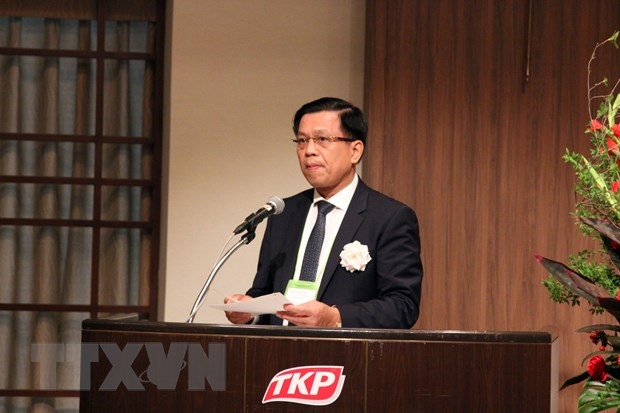 |
| Deputy Minister of MOLISA Nguyen Ba Hoan speaks at the event (Photo: VNA) |
The event drew the participation of representatives of a number of Japanese ministries, sectors and trade unions, along with nearly 50 representatives of Vietnamese dispatching companies.
Speaking at the workshop, Deputy Minister of MOLISA Nguyen Ba Hoan said that Vietnam has become a middle-income country and aims to soon become a modern industrialized country. To achieve that goal, building a team of highly skilled technical workers, with labor skills, sense of discipline, industrial manners, absorbing modern and advanced technologies is an important issue. Along with solutions on training and improving the quality of vocational training and job creation in the country, Vietnam advocates sending Vietnamese workers to work abroad.
According to him, currently, there are more than 500,000 Vietnamese workers working in 40 countries and territories. Over the past 30 years, more than 350,000 young Vietnamese have come to Japan to practice skills.
Since 2013, the number of Vietnamese interns entering Japan has increased sharply, from 10,200 in 2013 to 82,700 in 2019.
Currently, with more than 200,000 interns working in Japan, Vietnam is the leading country of 15 countries sending interns to the Northeast Asian country.
For special-skill workers, Vietnam and Japan signed a memorandum of cooperation on the Special-Skilled Labor Program in July 2019. Currently, there are about 41,000 Vietnamese special workers living and working in Japan.
For his part, Mr. Hiroaki Yagi, President of JITCO, said that the Japanese Government is currently reviewing the skilled intern program and the specific skilled labor program.
Besides, with the cooperation of the Government of Vietnam, the Japan International Cooperation Agency (JICA) is considering building a new recruitment system to eliminate intermediaries and reduce initial costs for interns.
Mr. Yagi emphasized that due to differences in monetary policy between Japan and the US, the Japanese Yen has depreciated rapidly against the US dollar. This has made Japan less attractive to foreign workers, making it more difficult to recruit interns to work in the country.
To address this issue, Japan's Central Minimum Wage Council has proposed raising the minimum wage in fiscal 2022 at a record high rate of 3.3%.
Meanwhile, Deputy Director of the Department of Overseas Labor Pham Viet Huong informed Japanese authorities and trade unions about Vietnam's new legal provisions, including the Law on Vietnamese people working abroad under a contract, approved by the National Assembly in 2020.
In addition, Mr. Huong also outlined some solutions of MOLISA to promote sending Vietnamese interns and workers to Japan after the COVID-19 pandemic./.